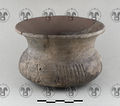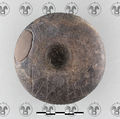NO-18 bowl: Difference between revisions
Sindy Kluge (talk | contribs) No edit summary |
Sindy Kluge (talk | contribs) No edit summary |
||
| Line 16: | Line 16: | ||
}} | }} | ||
==Commentary== | ==Commentary== | ||
Bowl with S-shaped profile.<br>Restored at two positions at the belly area, at the neck area as well as at the mouth rim. Fine clay of grey in colour with a moderate temper of fine grained sand and cast gold as well as argentine mica. Reduced firing. Compressed body, high and widely extended mouth rim; typical omphalos.<br>Between neck and body a decoration in form of a circumferential ribbon. On the belly further decoration: groups of ''striae'' which are arranged like metopes. In the middle of two ''striae''-groups another decoration in form of a {{c||Θ}} with a deep drilled hole in each triangle. The ''striae''-decorations before firing.<br>On the bottom a high number of [[index::NO-18|characters]].<br>Further find circumstances like exact find place or find year are unknown.<br>In accord with the typology the bowl can be dated to the 3rd–2nd centuries BC.<br>The [[index::NO-18 bowl|present bowl]] was probably first published in {{bib|IR}}: 290 (No. 82), however with particular regards to the inscription. According to Mancini the sherd was unpublished, however he indicates this statement as arguable. Mancini classifies the ceramic fragment into the group of objects from "''Niclara nel Comune di Cortaccia''" (cp. [[index::Entiklar / Niclara]] and [[index::Kurtatsch / Cortaccia]]; {{bib|IR}}: 290 (No. 82)). In consequence of Mancini, Schumacher arranges the inscription into the group of objects from [[index::Bozen / Bolzano]] with the sigla '''''B'''o'''Z'''en'' (cp. {{bib|Schumacher 2004}}: 183, [[index::BZ-18]]). The ceramic fragment however presents one of the discoveries from [[index::Dercolo]], therefore from the Non Valley, like the study and autopsy by the team of the ''Thesaurus Inscriptionum Raeticarum'' have shown. The number of the index card is 431 (cp. the relevant images above). It is arguable if this number is identical with the inventory number. There is also the catalogue number 255 related to the [[index::NO-18 bowl|present bowl]]. Before the reduction of the archaeological section at the [[index::Stadtmuseum Bozen / Museo Civico di Bolzano|Bozen Municipal Museum]] the bowl was in the permanent exhibition. There | Bowl with S-shaped profile.<br>Restored at two positions at the belly area, at the neck area as well as at the mouth rim. Fine clay of grey in colour with a moderate temper of fine grained sand and cast gold as well as argentine mica. Reduced firing. Compressed body, high and widely extended mouth rim; typical omphalos.<br>Between neck and body a decoration in form of a circumferential ribbon. On the belly further decoration: groups of ''striae'' which are arranged like metopes. In the middle of two ''striae''-groups another decoration in form of a {{c||Θ}} with a deep drilled hole in each triangle. The ''striae''-decorations before firing.<br>On the bottom a high number of [[index::NO-18|characters]].<br>Further find circumstances like exact find place or find year are unknown.<br>In accord with the typology the bowl can be dated to the 3rd–2nd centuries BC.<br>The [[index::NO-18 bowl|present bowl]] was probably first published in {{bib|IR}}: 290 (No. 82), however with particular regards to the inscription. According to Mancini the sherd was unpublished, however he indicates this statement as arguable. Mancini classifies the ceramic fragment into the group of objects from "''Niclara nel Comune di Cortaccia''" (cp. [[index::Entiklar / Niclara]] and [[index::Kurtatsch / Cortaccia]]; {{bib|IR}}: 290 (No. 82)). In consequence of Mancini, Schumacher arranges the inscription into the group of objects from [[index::Bozen / Bolzano]] with the sigla '''''B'''o'''Z'''en'' (cp. {{bib|Schumacher 2004}}: 183, [[index::BZ-18]]). The ceramic fragment however presents one of the discoveries from [[index::Dercolo]], therefore from the Non Valley, like the study and autopsy by the team of the ''Thesaurus Inscriptionum Raeticarum'' have shown. The number of the index card is 431 (cp. the relevant images above). It is arguable if this number is identical with the inventory number. There is also the catalogue number 255 related to the [[index::NO-18 bowl|present bowl]]. Before the reduction of the archaeological section at the [[index::Stadtmuseum Bozen / Museo Civico di Bolzano|Bozen Municipal Museum]] the bowl was in the permanent exhibition. There are also two other almost identical bowls with omphalos preserved at the [[index::Stadtmuseum Bozen / Museo Civico di Bolzano|Bozen Municipal Museum]]. These bowls are recorded with the index card numbers 430 and 433, both come also from [[index::Dercolo]].<br>Autopsied by the ''Thesaurus Inscriptionum Raeticarum'' in September 2014.<br>''S.K.'' | ||
{{bibliography}} | {{bibliography}} | ||
Revision as of 01:37, 8 January 2015
| Object | |
|---|---|
| Classification: | bowl |
| Archaeological type: | bowl with S-shaped profile |
| Material: | pottery |
| Size: | outside diameter 9.5 cm, height 8 cm |
| Condition: | restored |
| Date: | 3rd–2nd centuries BC |
| Date derived from: | typology |
|
| |
| Site: | Dercolo (fraction of: Campodenno, Trento, Trentino-Alto Adige, Italy) |
| Coordinates (approx.): | 46° 14' 56.40" N, 11° 2' 49.20" E [from site] |
| Find date: | |
| Current location: | Stadtmuseum Bozen / Museo Civico di Bolzano (repository) |
| Inventory Nr.: | 431 |
|
| |
| Inscription: | NO-18 (?/?) |
|
| |
| Sources: | IR: 290 (No. 82), fig. LIV c |
Images
|
Object NO-18 bowl.
|
Object NO-18 bowl with inscription NO-18.
|
Commentary
Bowl with S-shaped profile.
Restored at two positions at the belly area, at the neck area as well as at the mouth rim. Fine clay of grey in colour with a moderate temper of fine grained sand and cast gold as well as argentine mica. Reduced firing. Compressed body, high and widely extended mouth rim; typical omphalos.
Between neck and body a decoration in form of a circumferential ribbon. On the belly further decoration: groups of striae which are arranged like metopes. In the middle of two striae-groups another decoration in form of a ![]() with a deep drilled hole in each triangle. The striae-decorations before firing.
with a deep drilled hole in each triangle. The striae-decorations before firing.
On the bottom a high number of characters.
Further find circumstances like exact find place or find year are unknown.
In accord with the typology the bowl can be dated to the 3rd–2nd centuries BC.
The present bowl was probably first published in IR: 290 (No. 82), however with particular regards to the inscription. According to Mancini the sherd was unpublished, however he indicates this statement as arguable. Mancini classifies the ceramic fragment into the group of objects from "Niclara nel Comune di Cortaccia" (cp. Entiklar / Niclara and Kurtatsch / Cortaccia; IR: 290 (No. 82)). In consequence of Mancini, Schumacher arranges the inscription into the group of objects from Bozen / Bolzano with the sigla BoZen (cp. Schumacher 2004: 183, BZ-18). The ceramic fragment however presents one of the discoveries from Dercolo, therefore from the Non Valley, like the study and autopsy by the team of the Thesaurus Inscriptionum Raeticarum have shown. The number of the index card is 431 (cp. the relevant images above). It is arguable if this number is identical with the inventory number. There is also the catalogue number 255 related to the present bowl. Before the reduction of the archaeological section at the Bozen Municipal Museum the bowl was in the permanent exhibition. There are also two other almost identical bowls with omphalos preserved at the Bozen Municipal Museum. These bowls are recorded with the index card numbers 430 and 433, both come also from Dercolo.
Autopsied by the Thesaurus Inscriptionum Raeticarum in September 2014.
S.K.
Bibliography
| IR | Alberto Mancini, "Iscrizioni retiche", Studi Etruschi 43 (1975), 249–306. |
|---|

